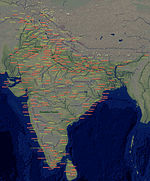- China in the Mahābhārata
-
 The manuscript of Mahabharata
The manuscript of Mahabharata
China in the Mahābhārata refers to an ancient Chinese people who lived across the Himalayas north of India in the first millennium BC or even earlier, and were mentioned in the ancient Indian epic Mahabharata. This was the earliest reference to the word "China", which may have been referring to either the Qin state which later became the Qin Dynasty, or a Chinese tribe that inhabited the Tibet region.
Contents
References in Mahabharata
Chinas along with other tribes
China is mentioned as one among the northern kingdoms:
Mahabharata, Book 6, chapter 9(MBh.6.9) mentions like this:- Among the tribes of the north are the Mlecchas, and the Kruras, the Yavanas, the Chinas, the Kamvojas, the Darunas, and many Mleccha tribes; the Sukritvahas, the Kulatthas, the Hunas, and the Parasikas; the Ramanas, and the Dasamalikas.
Chinas were mentioned along with Chivukas and Pulindas and Khasas, Hunas, Pahlavas, Sakas, Yavanas, Savaras, Paundras, Kiratas, Kanchis, Dravidas, Sinhalas and Keralas. All these tribes were described as Mlechha tribes. Here they were described as the protectors of sage Vasistha and his cow against the attack of king Viswamitra. (1,177)
Pahlavas and the Daradas and the various tribes of the Kiratas and Yavanas and Sakas and the Harahunas and Chinas and Tukharas and the Sindhavas and the Jagudas and the Ramathas and the Mundas and the inhabitants of the kingdom of women and the Tanganas and the Kekayas and the Malavas and the inhabitants of Kasmira were mentioned at (3,51) as bringing tribute to Pandava king Yudhisthira.
The Yavanas, the Kiratas, the Gandharvas, the Chinas, the Savaras, the Barbaras, the Sakas, the Tusharas, the Kankas, the Pathavas, the Andhras, the Madrakas, the Paundras, the Pulindas, the Ramathas, the Kamvojas were mentioned together as tribes beyond the kingdoms of Aryavarta. The Aryavarta kings had doubts on dealing with them. (12,64)
Pandava's travels
China is mentioned in the travel-descriptions of the Pandavas. The passage below, describes these Chinas, to be located somewhere in the high Himalayas:
Mahabharata book 3, chapter 176 (MBh 3.176):- Leaving the place called Badari (Badrinath in Uttarakhand) and crossing the difficult Himalayan regions, and leaving behind them, the countries of China, Tukhara, Darada and all the climes of Kulinda, rich in heaps of jewels, those warlike men viz the Pandavas, reached the capital of Suvahu, the king of Pulindas (Kiratas).
Other references
Bhima mentions about a China king Dhautamulaka, who caused the destruction of his own race (5,74).
Deer skins from China is mentioned at (5,86). King Dhritarashtra, wanted to give as present, a thousand deer-skins from China, to Vasudeva Krishna:- I will give him a thousand deer-skins brought from China and other things of the kind that may be worthy of his praise.
See also
- Kingdoms of Ancient India
- Sino-Indian relations
References
- Mahabharata of Krishna Dwaipayana Vyasa, translated to English by Kisari Mohan Ganguli
Categories:- Ancient Indian kingdoms
- Kingdoms in the Mahabharata
Wikimedia Foundation. 2010.



